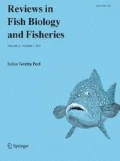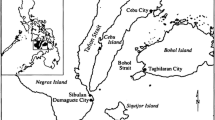Abstract
Despite its relevance, the economic contribution of small-scale fisheries to poverty alleviation is still poorly understood. This study investigates why some fishers perform economically better in fisheries than others under similar conditions and whether these variations in performance were due to individual adaptive strategies related to fishing technology and effort. A pairwise comparison between fishers’ income from the Brazilian equatorial region in 1994 and 2014 was performed while modeling individual changes related to the fishing activity (Generalized Linear Model, GLM) and the factors that would explain why fishers became richer or poorer over time (Proportional odds model). Fisher’s geographical region, the use of motorized boats and the adoption of hookah compressors explained income in 1994, whereas having larger boats and fishing with hook and line explained it in 2014. Fishers were slightly more likely to gain income if they changed their type of boat. Some fishers are trapped in poverty, and the changes they made were either not enough to leave this condition or made it worse. Escaping poverty traps in fisheries may require efforts beyond those available to the individuals, especially as stocks become increasingly overfished.
Graphical Abstract



Similar content being viewed by others
Data availability
All data generated or analysed during this study are included in this published article [and its supplementary information files].
References
Akaike H (1974) A new look at the statistical model identification. IEEE Trans Autom Control 19:716–723. https://doi.org/10.1109/TAC.1974.1100705
Asche F, Smith M D (2010) Trade and fisheries: key issues for the world trade organization. WTO
Azariadis C, Stachurski J (2005) Chapter 5 Poverty Traps. In: Handbook of economic growth. Elsevier, pp 295–384
Banerjee A, Duflo E (2012) Poor economics. PublicAffairs, New York
Barrett CB, Travis AJ, Dasgupta P (2011) On biodiversity conservation and poverty traps. Proc Natl Acad Sci 108:13907–13912. https://doi.org/10.1073/pnas.1011521108
Béné C (2003) When fishery rhymes with poverty: a first step beyond the old paradigm on poverty in small-scale fisheries. World Dev 31:949–975. https://doi.org/10.1016/S0305-750X(03)00045-7
Béné C, Friend RM (2011) Poverty in small-scale fisheries: old issue, new analysis. Prog Dev Stud 11:119–144. https://doi.org/10.1177/146499341001100203
Béné C, MacFadyen G, Allison EH (2005) Increasing the contribution of small-scale fisheries to poverty alleviation and food security. FAO, Rome
Chen C-S, Chiu T-S (2009) Standardising the CPUE for the Illex argentinus fishery in the Southwest Atlantic. Fish Sci 75:265–272. https://doi.org/10.1007/s12562-008-0037-1
Cinner J (2005) Socioeconomic factors influencing customary marine tenure in the Indo-Pacific. Ecol Soc 10:36
Cinner JE, Daw T, McCLANAHAN TR (2009) Socioeconomic factors that affect artisanal fishers’ readiness to exit a declining fishery. Conserv Biol 23:124–130. https://doi.org/10.1111/j.1523-1739.2008.01041.x
Damasio LMA, Peninno MG, Lopes PFM (2020) Small changes, big impacts: geographic expansion in small-scale fisheries. Fish Res 226:105533. https://doi.org/10.1016/j.fishres.2020.105533
de Damasio LMA, Lopes PFM, Guariento RD, Carvalho AR (2015) Matching fishers’ knowledge and landing data to overcome data missing in small-scale fisheries. PLoS ONE 10:e0133122. https://doi.org/10.1371/journal.pone.0133122
de Damasio LMA, Lopes PFM, Pennino MG et al (2016) Size matters: fishing less and yielding more in smaller-scale fisheries. ICES J Mar Sci J Cons 73:1494–1502. https://doi.org/10.1093/icesjms/fsw016
Diamond NB, Armson MJ, Levine B (2020) The truth is out there: accuracy in recall of verifiable real-world events. Psychol Sci 31:1544–1556. https://doi.org/10.1177/0956797620954812
Erisman BE, Allen LG, Claisse JT et al (2011) The illusion of plenty: hyperstability masks collapses in two recreational fisheries that target fish spawning aggregations. Can J Fish Aquat Sci 68:1705–1716. https://doi.org/10.1139/f2011-090
FAO (2008) Small-scale capture fisheries—a global overview with emphasis on developing countries. A preliminary report of the Big Numbers Project. FAO
FAO F and AO of the U (2016) Integrated ocean management—fisheries, oil, gas and seabed mining, by Melanie Torrie. Rome, Italy
FAO F and AO of the U (2017) Improving our knowledge on small-scale fisheries: data needs and methodologies: workshop proceedings, 27–29 June 2017, FAO, Rome, Italy
FAO (ed) (2018) Meeting the sustainable development goals. Rome
Fonteles Filho AA (1994) A pesca predatória de lagostas no estado do Ceará: causas e consequências. Bol Tec Cient CEPENE 2:107–131
Fox J, Weisberg S, Price B (2019) car package—companion to applied regression
Freire KMF, da de Almeida ZS, Amador JRET et al (2021) Reconstruction of marine commercial landings for the Brazilian industrial and artisanal fisheries from 1950 to 2015. Front Mar Sci 8:659110. https://doi.org/10.3389/fmars.2021.659110
Garcia F, Abdallah P, Sachsida A (2018) Avaliação de efeitos do programa PROFROTA Pesqueira sobre indicadores do mercado de trabalho. IPEA, Brasilia
Hamilton RJ, Almany GR, Stevens D et al (2016) Hyperstability masks declines in bumphead parrotfish (Bolbometopon muricatum) populations. Coral Reefs 35:751–763. https://doi.org/10.1007/s00338-016-1441-0
Harrell Jr F (2019) Hmisc package—Harrell miscellaneous
Heldt K, Stobart B, Mayfield S (2021) Diving into fisher experience: Do new entrants and fleet turnover depress catch rates in abalone (Haliotis laevigata and H. rubra) fisheries. Fish Res 238:105906. https://doi.org/10.1016/j.fishres.2021.105906
Henry L, Wickham H, Chang W (2019) ggstance package—horizontal “ggplot2” Components
Hirway I (2010) Understanding poverty: insights emerging from time use of the poor. In: Antonopoulos R, Hirway I (eds) Unpaid Work and the Economy. Palgrave Macmillan, London, pp 22–57
IBAMA (2007) Estatistica da Pesca 2007, Brasil—grandes regioes e unidades da Federacao. Estat Pesca 1–151
Jentoft S, Bavinck M, Alonso-Población E et al (2018) Working together in small-scale fisheries: harnessing collective action for poverty eradication. Marit Stud 17:1–12. https://doi.org/10.1007/s40152-018-0094-8
Jentoft S, Eide AH, Gunnarsdottir M-V (eds) (2011) Poverty mosaics: realities and prospects in small-scale fisheries. Springer, New York
Long J (2019) jtools package—analysis and presentation of social scientific data
Matlin MW (2009) Cognition, 7th edn. Wiley, Hoboken
MMA (2006) Programa REVIZEE: avaliação do potencial sustentável de recursos vivos Na Zona Econômica Exclusiva do Brasil—Relatório Executivo. Ministério do Meio Ambiente, Brasília
MMA (2008) Monitoramento da atividade pesqueira no litoral nordestino—Projeto ESTATPESCA. Ministério do Meio Ambiente, Tamandare
Neto JD (2010) Pesca no Brasil e seus aspectos institucionais—um registro para o futuro. Rev CEPSUL - Biodiversidade E Conserv Mar 1:66–80. https://doi.org/10.37002/revistacepsul.vol1.30066-80
NIS N de IS (2020) Índice de pobreza multidimensional. Belo Horizonte
Pauly D (2005) Rebuilding fisheries will add to Asia’s problems. Nature 433:457–457. https://doi.org/10.1038/433457a
Pauly D, Christensen V, Guénette S et al (2002) Towards sustainability in world fisheries. Nature 418:689–695. https://doi.org/10.1038/nature01017
Robinson D, Hayes A (2019) broom package —convert statistical analysis objects into tidy tibbles
Rousseau Y, Watson RA, Blanchard JL, Fulton EA (2019) Evolution of global marine fishing fleets and the response of fished resources. Proc Natl Acad Sci 116:12238–12243. https://doi.org/10.1073/pnas.1820344116
Sala E, Mayorga J, Costello C et al (2018) The economics of fishing the high seas. Sci Adv 4:eaat2504. https://doi.org/10.1126/sciadv.aat2504
Sen A (1981) Poverty and famines: an essay on entitlement and deprivation. Clarendon Press; Oxford University Press, Oxford
Sethi SA, Dalton M, Hilborn R (2012) Quantitative risk measures applied to Alaskan commercial fisheries. Can J Fish Aquat Sci 69:487–498. https://doi.org/10.1139/f2011-170
Silva MRO, Silva AB, Barbosa JC et al (2022) Empowering fisherwomen leaders helped reduce the effects of the COVID-19 pandemic on fishing communities: insights from Brazil. Mar Policy 135:104842. https://doi.org/10.1016/j.marpol.2021.104842
Silvano RAM, Nora V, Andreoli TB et al (2017) The ‘ghost of past fishing’: small-scale fisheries and conservation of threatened groupers in subtropical islands. Mar Policy 75:125–132. https://doi.org/10.1016/j.marpol.2016.10.002
Smith H, Basurto X (2019) Defining small-scale fisheries and examining the role of science in shaping perceptions of who and what counts: a systematic review. Front Mar Sci. https://doi.org/10.3389/fmars.2019.00236
Steneck RS, Pauly D (2019) Fishing through the Anthropocene. Curr Biol 29:R987–R992. https://doi.org/10.1016/j.cub.2019.07.081
Sumaila UR, Skerritt DJ, Schuhbauer A et al (2021) WTO must ban harmful fisheries subsidies. Science 374:544–544. https://doi.org/10.1126/science.abm1680
Team RDC (2018) R: a language and environment for statistical computing
Tesfamichael D, Pitcher TJ, Pauly D (2014) Assessing changes in fisheries using fishers’ knowledge to generate long time series of catch rates: a case study from the Red Sea. Ecol Soc. https://doi.org/10.5751/ES-06151-190118
Villasante S, Gianelli I, Castrejón M et al (2022) Social-ecological shifts, traps and collapses in small-scale fisheries: envisioning a way forward to transformative changes. Mar Policy 136:104933. https://doi.org/10.1016/j.marpol.2021.104933
Wei T, Simko V (2017) corrplot package—visualization of a correlation matrix
Wickham H, Chang W, Henry L, et al (2019) ggplot2 package—create elegant data visualisations using the grammar of graphics
World Fish Center (2005) Towards an interdisciplinary approach to the assessment of small-scale fisheries and its role in food security and poverty alleviation and sustainable resource use. Penand and Rome
Acknowledgements
LMAD thanks the Coordenação de Aperfeiçoamento de Pessoal de Nível Superior (CAPES, Brazil; Finance Code 001) for a PhD scholarship. ARCA (313334/2018-8) and PFML thanks CNPq for a productivity Grant (301515/2019-0).
Funding
This research did not receive any specific grant from funding agencies in the public, commercial, or not-for-profit sectors.
Author information
Authors and Affiliations
Corresponding author
Ethics declarations
Conflict of interest
The authors declare that they have no known competing financial interests or personal relationships that could have appeared to influence the work reported in this paper.
Additional information
Publisher's Note
Springer Nature remains neutral with regard to jurisdictional claims in published maps and institutional affiliations.
Supplementary Information
Below is the link to the electronic supplementary material.
Rights and permissions
Springer Nature or its licensor (e.g. a society or other partner) holds exclusive rights to this article under a publishing agreement with the author(s) or other rightsholder(s); author self-archiving of the accepted manuscript version of this article is solely governed by the terms of such publishing agreement and applicable law.
About this article
Cite this article
Damasio, L.M.A., Pennino, M.G., Villasante, S. et al. Adaptive factors and strategies in small-scale fisheries economies. Rev Fish Biol Fisheries 33, 739–750 (2023). https://doi.org/10.1007/s11160-022-09750-7
Received:
Accepted:
Published:
Issue Date:
DOI: https://doi.org/10.1007/s11160-022-09750-7




